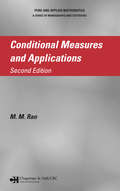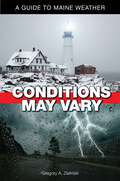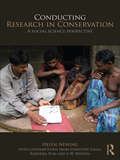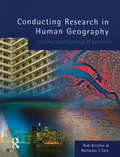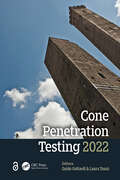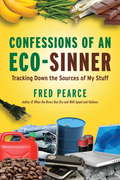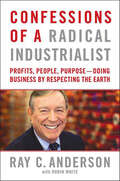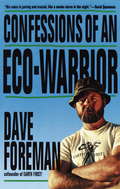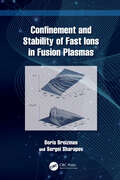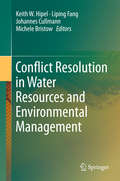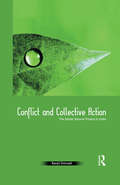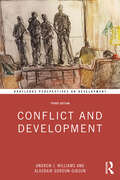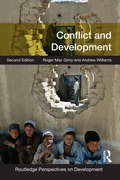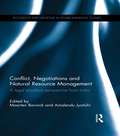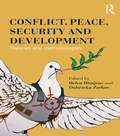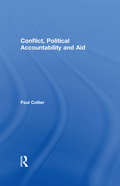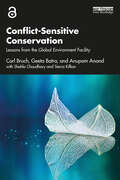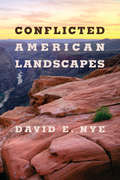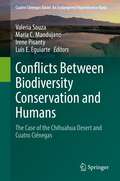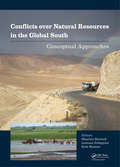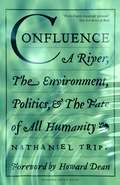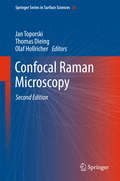- Table View
- List View
Conditional Measures and Applications
by M.M. RaoIn response to unanswered difficulties in the generalized case of conditional expectation and to treat the topic in a well-deservedly thorough manner, M.M. Rao gave us the highly successful first edition of Conditional Measures and Applications. Until this groundbreaking work, conditional probability was relegated to scattered journal articles and
Conditions May Vary: A Guide to Maine Weather
by Greg ZielinskiMaine's varied geography invites a variety of weather conditions. But, as former Maine State climatologist Gregory Zielinski proves, there's much more to Maine's weather than that. Jet stream, Gulf Stream, cold Canadian air masses, ocean temperature, and much more contribute to the challenges of predicting the weather here. Find out what makes Maine's weather so changeable - as well as endlessly fascinating.
Condor Comeback (Scientists in the Field Series)
by Sy MontgomerySibert Medalist, National Book Award Honoree, and New York Times best-selling author Sy Montgomery turns her formidable talents to the story of California condors and the scientists who have fought against their extinction in this installment in the award-winning Scientists in the Field series. In April of 1987 the last wild California condor was captured and taken to live in captivity like the other twenty-six remaining birds of its kind. Many thought that the days were over of of this remarkable, distinguished bird that had roamed the skies of North and Central American for thousands of years. Sy Montgomery employs her skill for on-the-ground reporting, shrewd observation, and stunning narrative prose to detail the efforts of scientists, volunteers, and everyday citizens to get California condors back in the wild. In particular, Montgomery profiles employees at the Santa Barbara Zoo who have worked tirelessly to raise abandoned chicks, nurse sick birds back to health, and conduct research that can support legislation to ban what is probably the largest threat to the existence of the wild condor: lead bullets. In turns affectionate and frustrated, hopeful and heartbreaking, Montgomery&’s powerful prose does justice to these ancient, sociable, and elegant creatures. Complete with world-class, full-color photography and helpful sidebars that provide details such as the history of the bird&’s fight back from extinction, the dangers of lead poisoning, and the relationship of condors to the Chumash nation, Condor Comeback is an inspiring story of groundbreaking science, perseverance, and cooperation.
Conducting Research in Conservation: Social Science Methods and Practice
by Helen NewingConducting Research in Conservation is the first textbook on social science research methods written specifically for use in the expanding and increasingly multidisciplinary field of environmental conservation. The first section on planning a research project includes chapters on the need for social science research in conservation, defining a research topic, methodology, and sampling. Section two focuses on practical issues in carrying out fieldwork with local communities, from fieldwork preparation and data collection to the relationships between the researcher and the study community. Section three provides an in-depth focus on a range of social science methods including standard qualitative and quantitative methods such as participant observation, interviewing and questionnaires, and more advanced methods, such as ethnobiological methods for documenting local environmental knowledge and change, and participatory methods such as the ‘PRA’ toolbox. Section four then demonstrates how to analyze social science data qualitatively and quantitatively; and the final section outlines the writing-up process and what should happen after the end of the formal research project. This book is a comprehensive and accessible guide to social science research methods for students of conservation related subjects and practitioners trained in the natural sciences. It features practical worldwide examples of conservation-related research in different ecosystems such as forests; grasslands; marine and riverine systems; and farmland. Boxes provide definitions of key terms, practical tips, and brief narratives from students and practitioners describe the practical issues that they have faced in the field.
Conducting Research in Human Geography: Theory, Methodology and Practice
by Rob Kitchin Nick TateReading this book is your first step to becoming a competent human geography researcher. Whether you are a novice needing practical help for your first piece of research or a professional in search of an accessible guide to best practice, Conducting Research in Human Geography is a unique and indispensable book to have at hand.The book provides a broad overview of theoretical underpinnings in contemporary human geography and links these with the main research methodologies currently being used. It is designed to guide the user through the complete research process, whether it be a one day field study or a large project, from the nurturing of ideas and development of a proposal, to the design of an enquiry, the generation and analysis of data, to the drawing of conclusions and the presentation of findings.
Cone Penetration Testing 2022: Proceedings of the 5th International Symposium on Cone Penetration Testing (CPT’22), 8-10 June 2022, Bologna, Italy
by Guido GottardiThis volume contains the proceedings of the 5th International Symposium on Cone Penetration Testing (CPT’22), held in Bologna, Italy, 8-10 June 2022. More than 500 authors - academics, researchers, practitioners and manufacturers – contributed to the peer-reviewed papers included in this book, which includes three keynote lectures, four invited lectures and 169 technical papers. The contributions provide a full picture of the current knowledge and major trends in CPT research and development, with respect to innovations in instrumentation, latest advances in data interpretation, and emerging fields of CPT application. The paper topics encompass three well-established topic categories typically addressed in CPT events: - Equipment and Procedures - Data Interpretation - Applications. Emphasis is placed on the use of statistical approaches and innovative numerical strategies for CPT data interpretation, liquefaction studies, application of CPT to offshore engineering, comparative studies between CPT and other in-situ tests. Cone Penetration Testing 2022 contains a wealth of information that could be useful for researchers, practitioners and all those working in the broad and dynamic field of cone penetration testing.
Confessions of An Eco-Sinner: Tracking Down the Sources of My Stuff
by Fred PearceA 2008 Indie Next Pick In Confessions of an Eco-Sinner, Fred Pearce surveys his home and then sets out to track down the people behind the production and distribution of everything in his daily life, from his socks to his computer to the food in his fridge. It’s a fascinating portrait, by turns sobering and hopeful, of the effects the world’s more than six billion inhabitants have on our planet-and of the working and living conditions of the people who produce most of these goods.
Confessions of a Radical Industrialist: Profits, People, Purpose—Doing Business by Respecting the Earth
by Robin White Ray C. AndersonIn 1994, Interface founder and chairman Ray Anderson set an audacious goal for his commercial carpet company: to take nothing from the earth that can't be replaced by the earth. Now, in the most inspiring business book of our time, Anderson leads the way forward and challenges all of industry to share that goal. The Interface story is a compelling one: In 1994, making carpets was a toxic, petroleum-based process, releasing immense amounts of air and water pollution and creating tons of waste. Fifteen years after Anderson's "spear in the chest" revelation, Interface has:-Cut greenhouse gas emissions by 82%-Cut fossil fuel consumption by 60%-Cut waste by 66%-Cut water use by 75%-Invented and patented new machines, materials, and manufacturing processes-Increased sales by 66%, doubled earnings, and raised profit marginsWith practical ideas and measurable outcomes that every business can use, Anderson shows that profit and sustainability are not mutually exclusive; businesses can improve their bottom lines and do right by the earth.
Confessions of an Eco-Warrior
by Dave ForemanA book that will set the course for the environmental movement for years to come, Confessions of an Eco-Warrior is an inspiring ecological call to arms by America's foremost and most controversial environmental activist. "Rude and brilliant. Read it and you will see the future". --William Kittredge.
Confinement and Stability of Fast Ions in Fusion Plasmas
by Boris Breizman Sergei SharapovThis book explores the physics of fast ions and fast ion- driven instabilities. It also describes modern theory of near- critical nonlinear wave– particle systems with the particle source and wave damping. Such a theory was developed by H.L. Berk and B.N. Breizman in the mid- 1990s, and it delivered outstanding results successfully explaining the experimentally observed collective phenomena driven by energetic ions.A systematic and step-by-step analysis of resonant interactions between the waves in plasmas and various types of energetic ion populations is presented and analyzed, taking the readers on an exciting journey into the world of nonlinear physics and cutting-edge experiments performed on the world’s major magnetic fusion machines.The phenomena described in this book will be of interest for researchers studying fusion, solar plasma, space plasma, and for a broader realm of scientists working in nonlinear phenomena.Key Features: Features experimental data and the Berk-Breizman theory on nonlinear evolution of energetic particle-driven waves Describes in simple terms, the recent advances in the diagnostics of energetic particles and Alfvén waves Presents a systematic overview of extrapolating results presented in other types of plasmas (e.g., solar and space) and nonlinear systems.
Conflict Resolution in Water Resources and Environmental Management
by Keith W. Hipel Liping Fang Johannes Cullmann Michele BristowThe latest developments regarding the theory and practice of effectively resolving conflict in water resources and environmental management are presented in this book by respected experts from around the globe. Water conflicts are particularly complex and challenging to solve because water and environmental issues span both the societal realm, in which people and organizations interact, and the physical world which sustains all human activities. For instance, when large-scale water diversions take place across political jurisdictions, conflicts may ensue among stakeholders within and across regions, while the water transfers may cause severe damage to sensitive ecological systems. Therefore, to arrive at realistic and fair resolutions, one must take into account not only the economics and politics of the situation but also the water quantity and quality changes that may occur within the altered hydrological system as well as the ecosystems contained therein. When the effects of climate change and the closely connected activities of energy production and usage are also considered, the complexity of the problem becomes even greater and messier. Accordingly, one must adopt an integrative and adaptive approach to water and environmental governance that specifically recognizes the conflicting value systems of stakeholders, including nature and future generations even though they are not present at the bargaining table. The 16 chapters in this leading-edge book are written by authors who presented their original research at the International Conference on Water Resources and Environment Research (ICWRER) 2013, which was held in Koblenz, Germany, from June 3rd to 7th, 2013, and subsequently submitted expanded versions of their research for review and publication in this timely book. The rich range of contributions are put into perspective in the first chapter and then categorized into four main interconnected parts: Part I: Management and EvaluationPart II: Global, Trans-boundary and International Dimensions Part III: Consensus-building, Bargaining and Negotiation Part IV: Ecological and Socio-economic Impacts
Conflict and Collective Action: The Sardar Sarovar Project in India
by Ranjit DwivediFor over two decades, large infrastructure development projects have been the subject of major controversies the world over. This book is a comprehensive account of the well-known Sardar Sarovar Project in India and the world-wide campaign against it led by the Narmada Bachao Andolan.The book attempts to understand the unfurling crisis around the Project in order to develop a comprehensive sociology of development action that goes beyond positivist methods and evaluative frames. It deals with three main research concerns: first, the theoretical focus on actually existing development; second, a methodological query concerning critical analysis; and third, the substantive examination of the NBA and its collective action against displacement in the Narmada Valley. Published posthumously, the book ends with the Supreme Court judgement on the Sardar Sarovar Dam. Amita Baviskar, well-known expert in the field, brings the debate up to the present in the
Conflict and Development (Routledge Perspectives on Development)
by Andrew J. Williams Alasdair Gordon-GibsonFully revised and updated in its third edition, this timely book brings together the study of conflict and war and the problems surrounding the economic development of developing societies that are most prone to experiencing problems in moving on after war.The book does so by reflecting on the issues surrounding war as it unfolds and after it has (in principle) ‘ended’, within the context of the history, present-day problems and future prospects. The book aims to highlight the possibilities, successes and failures of past and present policies that bring ‘development’ to countries and peoples that want to be more involved in deciding their own futures after conflict and war, and often find themselves subject to what can be seen as arbitrary and even alien ways of thinking and acting by institutions in which they theoretically have membership and agency but often do not in practice. The case studies have been fully updated to reflect changes and developments since the second edition of this text, and there are questions at the end of each chapter to promote reflection. This new edition presents a deeper dive into the history of conflict and the emergence of new theories and policy guidance about present and future options in the fields of conflict and development.Accessible and engaging, this textbook is a pivotal resource for a nexus of subjects related to the often separated fields of conflict and development studies, as well as practitioners in this area.
Conflict and Development (Routledge Perspectives on Development)
by Andrew Williams Roger Mac GintyIn the five years since the first edition of Conflict and Development was published the awareness of the relationship between conflicts and development has grown exponentially. Developmental factors can act as a trigger for violence, as well as for ending violence and for triggering post-conflict reconstruction. The book explores the complexity of the links between violent conflict (usually civil wars) and development, under-development and uneven development. The second edition incorporates significant changes in the field including the G7+ initiative, the New Deal on Fragile States, World Trade talks, major policy documents from the UNDP and World Bank and updates on the Afghanistan and Iraq wars.
Conflict, Negotiations and Natural Resource Management: A legal pluralism perspective from India (Routledge Explorations in Environmental Studies)
by Maarten Bavinck Amalendu JyotishiConflicts over natural resources abound in India, where much of the population is dependent on these resources for their livelihoods. Issues of governance and management are complicated by the competing claims of parallel legal systems, including state, customary, religious, project and local laws. Whereas much has been written about property rights, this unique collection takes a legal anthropological perspective to explore how the coexistence and interaction between multiple legal orders provide bases for claiming property rights. It examines how hybrid legal institutions have developed over time in India and how these impact on justice in the governance and distribution of natural resources. The book brings together original case studies that offer fresh perspectives on the governance of forests, water, fisheries and agricultural land in a diverse range of social and spatial contexts. This brand new research provides a timely and persuasive overview of the fundamental role of parallel legal systems in shaping how people manage natural resources. It will be of interest to scholars and practitioners of environmental law, property law, environmental politics, anthropology, sociology and geography.
Conflict, Peace, Security and Development: Theories and Methodologies
by Dubravka Zarkov Helen HintjensWhilst classical approaches linked development with peace, security has become central to understandings of both war and peacetime. This book uniquely reflects on how to deal with the convergence of war and peace in the context of global economic and geo-political development. It addresses methodological challenges in contemporary approaches to conflict, violence, security peace and development. Two dominant contemporary approaches are selected for debate on methodologies and ethical choices: rational choice and identity-based theorizing. The chapters are arranged as dialogues around contending approaches, to better understand how the inter-locking fields of violent conflict, peace, development and security can be researched and understood. The book considers how theoretical and methodological approaches relate to different ethical and political choices, including around engagement and intervention in the four interwoven fields. Theoretical, methodological and ethical issues emerge from the critical reviews of academic discourses and case-study based chapters from across the world, including Sri Lanka, Ghana, Colombia and Rwanda. This book is an invaluable resource for postgraduate students and researchers in Development Studies, Conflict Studies, Peace Studies and Security Studies.
Conflict, Political Accountability and Aid
by Paul CollierPaul Collier’s contributions to development economics,and in regard to Africa in particular, have marked him out as one of the most influential commentators of recent times. His research has centred upon the causes and consequences of civil war, the effects of aid, and the problems of democracy in low-income and natural-resource-rich societies. His work has also enjoyed substantial policy impact, having seen him sit as a senior adviser to Tony Blair’s Commission on Africa and addressed the General Assembly of the United Nations This collection of Collier’s major writings, with assistance from Anke Hoeffler and Jan Gunning, and accompanied by a new introduction, provide the definitive account of a wide range of macroeconomic, microeconomic and political economy topics concerned with Africa. Within macroeconomics, there is a focus on external shocks, exchange rate and trade policies, whilst microeconomic topics focus upon labour and financial markets, as well as rural development. Collier’s book The Bottom Billion had become a landmark book and this summation of the research underpinning it will be a superb guide for all those concerned with African development.
Conflict-Sensitive Conservation: Lessons from the Global Environment Facility
by Carl Bruch Geeta Batra Anupam Anand Shehla Chowdhury Sierra KillianThis book provides an empirically formulated foundation for conflict-sensitive conservation, a field in which the existing literature relies primarily on anecdotal evidence. Seeking to better understand the impact of conflict on the implementation and outcomes of environmental projects, the Global Environment Facility (GEF) Independent Evaluation Office and the Environmental Law Institute undertook an evaluation of GEF support to fragile and conflict-affected contexts. Following a qualitative and quantitative analysis of documents from more than 4,000 projects, the research team discovered a statistically significant negative correlation between a country’s Fragile States Index score and the implementation quality of environmental projects in that country. In this book, the evaluation and research team explain these groundbreaking findings in detail, highlighting seven key case studies: Afghanistan, Albertine Rift, Balkans, Cambodia, Colombia, Lebanon, and Mali. Drawing upon additional research and interviews with GEF project implementation staff, the volume illustrates the pathways through which conflict and fragility frequently impact environmental projects. It also examines how practitioners and sponsoring institutions can plan and implement their projects to avoid or mitigate these issues and find opportunities to promote peacebuilding through their environmental interventions. Examining data from 164 countries and territories, this innovative book will be of great interest to students and scholars of environmental management, conservation, international development, and the fast-growing field of environmental peacebuilding. It will also be a great resource for practitioners working in these important fields.
Conflicted American Landscapes
by David E. NyeHow conflicting ideas of nature threaten to fracture America's identity.Amber waves of grain, purple mountain majesties: American invest much of their national identity in sites of natural beauty. And yet American lands today are torn by conflicts over science, religion, identity, and politics. Creationists believe that the Biblical flood carved landscapes less than 10,000 years ago; environmentalists protest pipelines; Western states argue that the federal government's land policies throttle free enterprise; Native Americans demand protection for sacred sites. In this book, David Nye looks at Americans' irreconcilably conflicting ideas about nature.A landscape is conflicted when different groups have different uses for the same location—for example, when some want to open mining sites that others want to preserve or when suburban development impinges on agriculture. Some landscapes are so degraded from careless use that they become toxic &“anti-landscapes.&” Nye traces these conflicts to clashing conceptions of nature—ranging from pastoral to Native American to military–industrial—that cannot be averaged into a compromise. Nye argues that today&’s environmental crisis is rooted in these conflicting ideas about land. Depending on your politics, global warming is either an inconvenient truth or fake news. America&’s contradictory conceptions of nature are at the heart of a broken national consensus.
Conflicts Between Biodiversity Conservation and Humans: The Case of the Chihuahua Desert and Cuatro Ciénegas (Cuatro Ciénegas Basin: An Endangered Hyperdiverse Oasis)
by Valeria Souza Luis E. Eguiarte Irene Pisanty María C. MandujanoThis book takes readers on a journey through the history of water in the Coahuila desert. It starts by describing the beauty and mysteries of the landscape, and then explores the rock art of the original desert cultures in Coahuila, offering readers a glimpse of the sacred nature of water in the desert, as well as the rituals surrounding it. Moving on to the colonial times and the post- independence development of the region, it discusses early water management, and explores how water is managed in modern times, as well as the legal complications of the law, and how these faulty laws, designed for less arid regions, have affected a highly diverse wetland, the Cuatro Ciénegas oasis. The book then examines the biological consequences of the water loss for the aquatic plants and animals in Churince – a now extinct system within Cuatro Ciénegas. Further, it addresses how even bacteria can become extinct in this hyper-diverse microbial oasis. Lastly, after this despair and sense of loss, the book provides hope, offering suggestions for how we can transform the future, from a social and educational point of view as well as through good science and changes in policy.
Conflicts over Natural Resources in the Global South: Conceptual Approaches
by Lorenzo Pellegrini Maarten Bavinck Erik MostertInhabitants of poor, rural areas in the Global South heavily depend on natural resources in their immediate vicinity. Conflicts over and exploitation of these resources � whether it is water, fish, wood fuel, minerals, or land � severely affect their livelihoods. The contributors to this volume leave behind the polarised debate, previously surround
Confluence: A River, The Environment, Politics, & The Fate of All Humanity
by Nathaniel TrippAmidst the global free market economy, the author warns us against the politicization of various issues and wants us to look at the larger issues like global warming.
Confocal Raman Microscopy (Springer Series In Optical Sciences #158)
by Jan Toporski Thomas Dieing Olaf HollricherThis second edition provides a cutting-edge overview of physical, technical and scientific aspects related to the widely used analytical method of confocal Raman microscopy. The book includes expanded background information and adds insights into how confocal Raman microscopy, especially 3D Raman imaging, can be integrated with other methods to produce a variety of correlative microscopy combinations. The benefits are then demonstrated and supported by numerous examples from the fields of materials science, 2D materials, the life sciences, pharmaceutical research and development, as well as the geosciences.
Conformal Field Theory for Particle Physicists: From QFT Axioms to the Modern Conformal Bootstrap (SpringerBriefs in Physics)
by Marc GilliozThis book is a set of introductory lecture notes on Conformal Field Theory (CFT). Unlike most existing reviews on the subject, CFT is presented here from the perspective of a unitary quantum field theory in Minkowski space-time. The book starts with a non-perturbative formulation of quantum field theory (Wightman axioms) and then, gradually, focuses on the implications of scale and special conformal symmetry, all the way to the modern conformal bootstrap. This approach includes topics such as subtleties of conformal transformations in Minkowski space-time, the construction of Wightman functions and time-ordered correlators both in position- and momentum-space, unitarity bounds derived from the spectral representation, and the appearance of UV and IR divergences. In each chapter, the reader finds useful exercises to master the subject. This book is meant for graduate students in theoretical physics and for more advanced researchers working in high-energy physics who are not necessarily familiar with the concepts of conformal field theory. Prior knowledge of quantum field theory is needed to master the arguments.
Conformal Invariance: An Introduction To Loops, Interfaces And Stochastic Loewner Evolution (Lecture Notes in Physics #853)
by Dragi Karevski Malte HenkelConformal invariance has been a spectacularly successful tool in advancing our understanding of the two-dimensional phase transitions found in classical systems at equilibrium. This volume sharpens our picture of the applications of conformal invariance, introducing non-local observables such as loops and interfaces before explaining how they arise in specific physical contexts. It then shows how to use conformal invariance to determine their properties. Moving on to cover key conceptual developments in conformal invariance, the book devotes much of its space to stochastic Loewner evolution (SLE), detailing SLE's conceptual foundations as well as extensive numerical tests. The chapters then elucidate SLE's use in geometric phase transitions such as percolation or polymer systems, paying particular attention to surface effects. As clear and accessible as it is authoritative, this publication is as suitable for non-specialist readers and graduate students alike.
